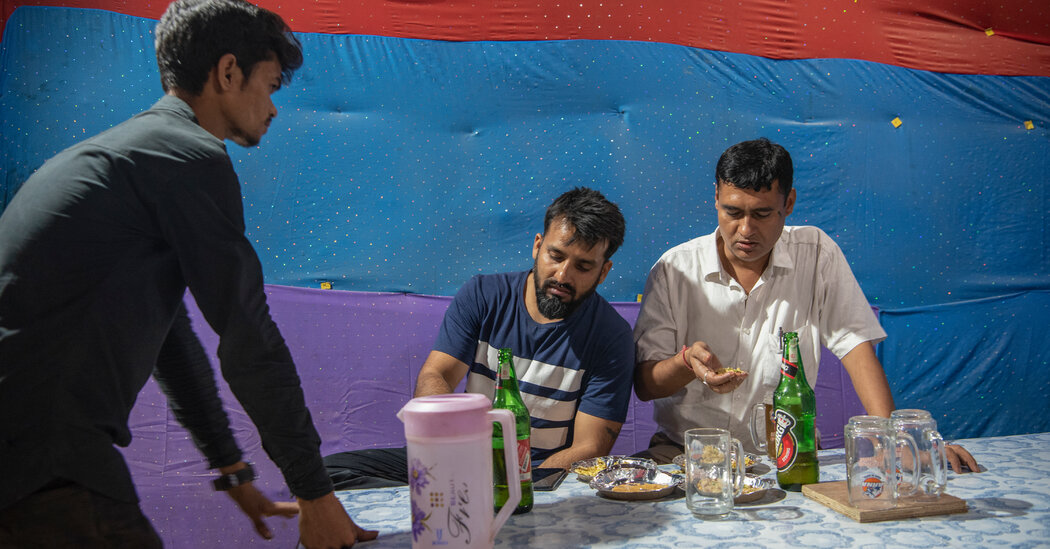
AT THE NEPAL-INDIA BORDER — As the afternoon heat gives way to a pleasant evening breeze, a palpable shift starts to happen in the makeup of the crowd flowing from India into Nepal across an open border.
At first, there are Nepalis, a large number of them women, returning home after a quick shopping trip for cheaper goods and groceries on the Indian side. Two women in colorful saris split the load of a heavy bag, gripping one handle each. A man carries a fan in the back of a cycle rickshaw, its blades spinning in the wind; another pedals his bicycle with a single watermelon fastened to its back.
But as it starts to grow dark, a large share of the crowd crossing the border are men who come mostly empty-handed. Men with government jobs, shirts tucked in and shoes polished in the morning, who are dropped off at the border in their vehicles. And men who pedal their bicycles with heavy legs and heavy thoughts, the tools of their daily trade dangling in a bag from the handle.
These are Indian men entering Nepal for a drink or two — or as many as they can squeeze in before the police blow a whistle and the roadside bars close around 9 p.m.
The border between India and Nepal, barring moments of political tension, has been an example of how an open policy helps frontier people enjoy wider economic choices. Take the needs of the motorcycle, a favorite means of transportation here, as an example: Spare parts are cheaper in India; fuel is cheaper in Nepal.
That openness has been particularly welcomed by local drinkers since the Indian state of Bihar, which has over 100 million people and shares a border with Nepal more than 400 miles long, banned alcohol in 2016. A small industry of bars and restaurants has sprung up just across the border on the Nepali side, catering to Indians of all classes seeking to quench their thirst.
The ban in Bihar, championed by local women, was aimed at tackling the rampant problems of alcoholism, domestic violence and squandered earnings. The penalties for getting caught with alcohol have been severe. A first-time offender must pay hundreds of dollars in fines or spend a month in jail; repeat offenders are sentenced to a year.
The government of the state’s chief minister, Nitish Kumar, has said the prohibition has helped in reducing violence and crime, though the proximity of the border and the ease of crossing it have lessened the law’s effect.
The ban has also given rise to challenges. The judiciary is clogged with alcohol cases. The state is losing hundreds of millions of dollars every year in alcohol taxes. And liquor is still available — smuggled in and sold at double or triple the price.
One Indian farmer, straddling a bench at one of the roadside bars in Nepal with two bottles of cheap grain spirit in front of him, said the chief minister wins elections because women vote for him in appreciation of the alcohol ban.
But the farmer, Mr. Gupta, who shared only his last name because he planned on breaking the law by taking alcohol back with him across the border, said the policy had simply jacked up the price of alcohol, as it was still available but at two or three times the price.
While still on the Nepal side of the border, he purchased a third bottle to go, wrapping it in his shawl and tying it to the back of his bicycle. As he wobbled away back toward Bihar, he assured everyone who could hear him that he wasn’t drunk.
The open border area is vast, and so is the diversity of the evening alcohol scene that has grown across it in Nepal.
The well-off from India drive to the town of Janakpur, or the sought-after hill areas, where the bars are air-conditioned, the alcohol imported, the scenes rowdy — and at times obnoxious.
In one hotel bar in Janakpur, as the men grew tipsy around the table, they mixed shouts of “bottoms up!” with addressing the waiters by derogatory names as they ordered the next round. In another hotel, the unease of being spotted drinking in Bihar still appeared to grip two men who had driven over for lunch: They poured their beers into mugs tucked discreetly under the table.
Umesh Yadav, a Nepali university lecturer from the border town of Jaleshwar, said the economic opportunity of an open border is much greater than small troubles that come with an increase in drunken customers.
“When they drink, obviously there is trouble sometimes,” he said. “But police is always there.”
In the Maruwahi stretch of the border, much of the drinking happens in the mango orchards that hug the dividing line, at picnics that are all about what’s in the bottle, not a food basket.
Men in small huddles joke and laugh as they gulp from plastic bottles, their bicycles parked close by. Others crouch under trees as they receive their bottles from the suppliers making their rounds — bartenders on the go. Some drink in the quiet company of a friend — or in the company of their own thoughts, staring at the sun fading over the shoulders of a group of Indian border guards in the distance.
In a village about a mile from the orchards, a bar owner said he had recently installed CCTV cameras for security — but had to remove them after a matter of days when his customers disappeared, worried they were being filmed.
The border point at Mahottari is an equalizer of sorts. All kinds of crowds mingle at the dozen simple shacks that serve as bars.
“We used to sell education before, now we sell alcohol,” Kundan Mehta, who had run a books and stationery store in Bihar before setting up the Hotel Navrang on the Nepali side about five years ago, said with a smile. “I tell them, ‘Enough studying, son, get a drink now.’”
Inside, a small television tied to a bamboo pole broadcast a live cricket match. The walls were adorned with posters of a Bollywood actress, a Hindu spiritual leader and charging horses with inspirational quotes on going after what you want.
One customer, Ravi Kumar, wanted a drink of Golden Oak, a cheap local grain spirit.
“You know you can’t get a drink there,” said Mr. Kumar, a farmer, pointing toward India.
He crosses the border about twice a week to drink — more often than that would not be affordable, he said.
“If you do too much” — he raised his fist with thumb sticking out toward his mouth, sign language for drinking in this part of the world — “then you need” — he rubbed together the fingers of his right hand in the sign for money.
Ankit, 22, who works for a local bank about an hour from the border, had endured a long week working on deadline to finish hundreds of loan collections. He had taken a bus to the border straight from work, to have the local delicacy of fried fish. Ankit, who spoke on condition that his family name not be used because he was going to illegally smuggle some alcohol back into India, mixed beer with a bottle of local liquor.
“It helps me release some of the stress,” he said.
As Ankit settled his bill, he bought two small bottles to go. A Nepali woman wearing an orange sari was waiting at the counter, ready to earn a small fee for her coming smuggling mission.
“Let’s go,” Ankit said. “I am getting late, I will miss the bus.”
“Roji-roti,” the Nepali woman replied and smiled. Local slang, it literally means “daily bread” and carries the connotation of a person’s livelihood.
She tucked the bottles into the waist of her sari and led the way.
Birkha Shahi, the commander of the nearby Nepali border outpost, was understanding. He said that his forces don’t really crack down on one or two bottles being smuggled, but focus on large-scale smuggling.
“We get tired of seizing them, but they don’t get tired of trying,” he said. “Roji-roti.”




